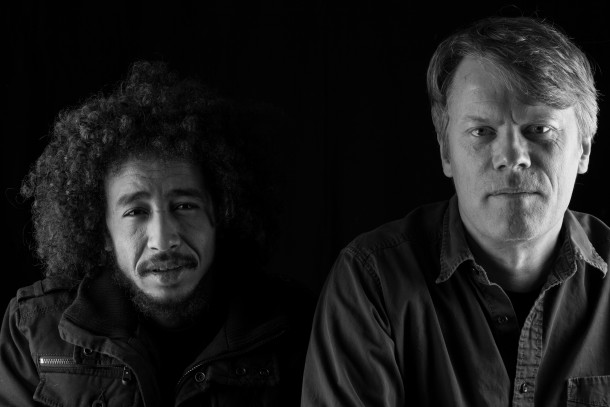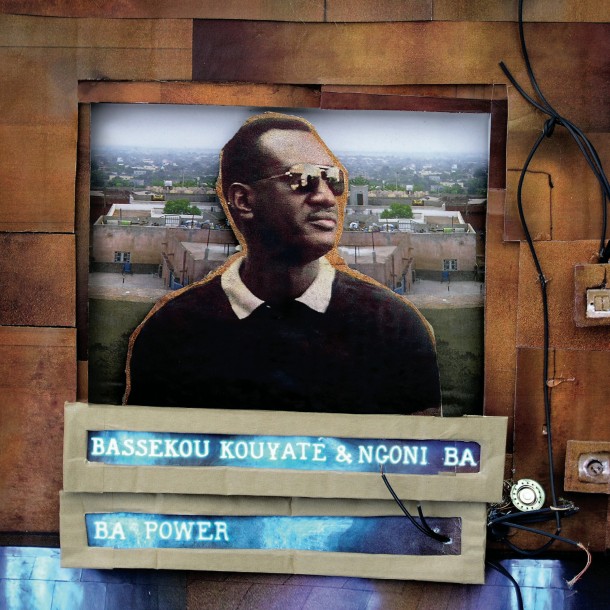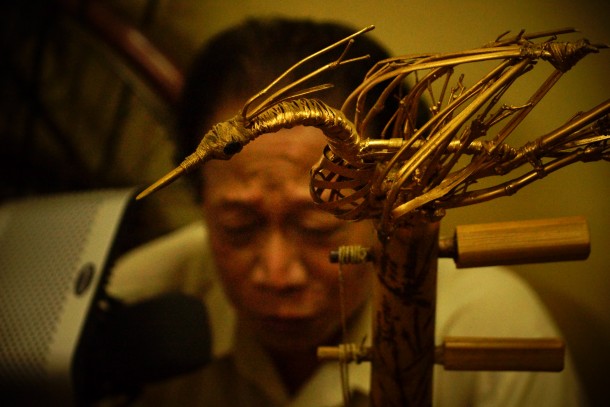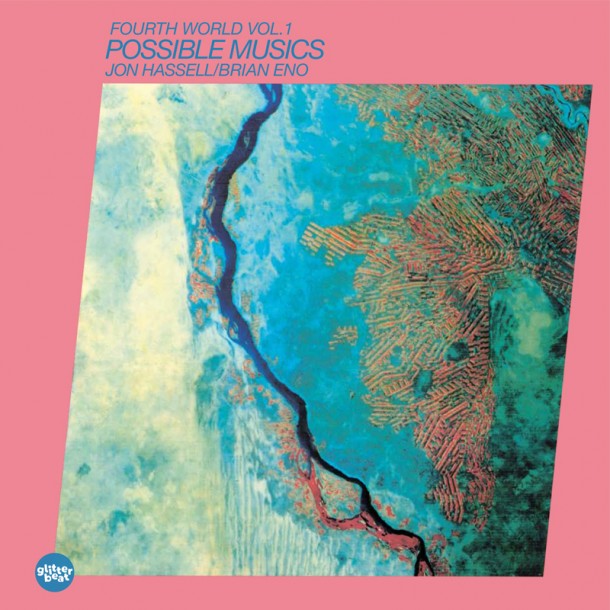



Ousmane Ag Mossa (Tamikrest) & Chris Eckman
photo by Jaka Babnik
Each month, we are focusing on a record label founded by an active digger. This month, Chris Eckman, is a musician, record producer and soundtrack composer. In 2012, he cofounded a german label Glitterbeat with Peter Weber, currently the owner of the well-established German independent label Glitterhouse. Their trademark: the vibrant global sounds.
When did you start digging records?
At a very young age. I was already listening to LPs when I was 5 years old.
What Lps did you buy at first? Do you still listen to them?
The first album I ever bought with my own money, or at least money my parents gave me, was Deja Vu by Crosby, Stills, Nash & Young. That started a life long fascination with Neil Young.
Do you have a particular style or favorite period?
That of course changes over the years. I listen to a lot of West African music of course, from the ’70’s golden period as well as contemporary stuff. Also these days I am really into 20th century minimalist composition and dub and Krautrock. I don’t listen to much rock music anymore.
Are you still digging’, buying vinyl, visiting record shops?
Of course. I don’t do it as much as I would like, but I can pass hours away in the right store.
What was your first release on Glitterbeat?
A 12” Ben Zabo remix by the Berlin legend Mark Ernestus. We did a limited edition of 500. We sold them out immediately. I wish it was always so easy as that!
Why did you choose this name : Glitterbeat ?
We stated as an outgrowth of the German independent record company Glitterhouse. We wanted a name that connected us to them. We are now separate companies but the name suits us fine.
What could be your editorial/esthetic line?
This line is not incredibly fixed, but we definitely are not interested in music from the standard western pop-rock hegemony, at least in terms of our label. But we are also not interested in being narrow in the way we define what we do. By the end of this year we will have released albums from Mali, Mauritania, Western Sahara, the UK, Italy, Vietnam, Brazil and Haiti.

How do you decide on the choice of reissues/issues ?
It is pretty simple: do we love it. Would we grab it off the self and play it… would we buy it ourselves? Those are the only sensible criteria. We have to feel a real emotional commitment to the music first, and then we can start thinking about the business side of things.
What is the best deal/business : to make reissues or to produce/coproduce new records?
Reissues are a safer business. There is much less investment involved. But we are really committed to bringing forward new sounds and perspectives and while that may be more risky, it is ultimately where our satisfaction comes from.
How do you find brand new talents ?
Every way possible. We talk to people we trust, we scan the internet, we listen to music that is sent to us and so on. But probably the most element for us has been the direct contacts we made during travels to Mali. That is really how the whole label got started. We met Tamikrest in a tent at Festival au Desert in 2008 and everything grew from that chance encounter.
Another part of your catalogue is focused on the Sahara soundtrack. What type of sound are you looking for? And is it more and more difficult to find a real singular talent coming from this musical area?
It is difficult to find singular talent, anywhere, anytime. There is such a vast amount of music in the world and only a small degree is special to any given person. It is all very subjective. In West Africa there is an incredibly rich musical tradition, but how many artists are there that can translate that tradition onto something singular? Hard to say, but probably there are the same amount of standout artists there as anywhere else: no more, no less.
Recently, you had published a strange production : ‘War Is A Wound, Peace Is A Scar’. It’s a sort of UFO dedicated to radio stations… Who’s got the idea ? And is it an experience your could reproduce?
The recording was done by a very interesting guy, Ian Brennan who has produced albums by Tinariwen and Malawi Mouse Boys and many others. He is very much into the idea of going to places where the musical traditions are not that well known in the western world, and documenting them simply and with respect. His Vietnam recordings really struck us. The emotion and soul of the performances is really deep. Many of the songs are about the Vietnam war and its aftermath, sung by musicians who experienced the horror first hand.

Photo by Marilena Delli
What could be the label’s leitmotif?
I think this description from our website pretty much captures it: « Glitterbeat is built upon sounds and artists that transcend cultural pre-conceptions and genre specificity. Music throughout the world is now part of a digitized and intersecting conversation that does not follow predictable and easily delineated paths. It is a conversation filled with hybrids and cross-talk. The label was created to release records that simultaneously embrace evolving global textures and localized traditions and roots. »
Why did release the reissue of ‘Fourth World Vol. 1’ ? What does this LP represent in your own universe ? A goal ? A reference ?
It was a hugely influential album for me when it first came out. I was at university and that album and the Eno/Byrne collaboration ‘My Life in the Bush of Ghosts’ really changed the way I thought about music. It opened up new musical worlds. Soon after I was listening to Fela Kuti and Art Ensemble of Chicago and 23 Skidoo and so on. When I realized that it had never been reissued, it just seemed like a natural fit for us. ‘Fourth World’ is a big part of the story that led to Glitterbeat.
Have you received many negative answers on some of the LPs you were trying to reissue?
We don’t try to do so many reissues, so we don’t really get a lot of closed doors. The one album we got to too late was ‘Akwaaba’ by Francis Bebey. By the time I had tracked down his son Patrick, I found out that Born Bad had licensed tracks from the album already a few weeks before. In the end, we weren’t that disappointed. Born Bad did a wonderful reissue and the most important thing is that the music was heard again.

There are more and more reissues of old LPs, and more and more record labels (major or indie) now release their new artists on LP, or EP. Do you think that the LP reissue market could ever reach saturation point?
I think we are already there to a large extent. There are some dubious reissues out there already and that doesn’t help the situation. Not every album that was recorded in Nigeria or Ghana in the 70’s was great.
What are your next releases ?
The new Bassekou Kouyate album came out at the end of April and then we released an album by an Italian group called Sacri Cuori. they are very influenced by Italian soundtrack masters like Nino Rota and Ennio Morricone. And then in June we put out a vinyl only release by Hayvanlar Alemi a psych-rock band from Turkey. A couple of years back they made a dub album called ‘Visions of a Psychedelic Ankara’ and we reissue it.
What is the LP you dream of reissuing?
In 1980 Brian Eno went to Ghana and produced an album by a Ghanaian group called Edikanfo. To my knowledge it is the only album they ever did. I have never been able to find who has the rights. It is a wonderful album and I would love to have Glitterbeat release it someday.